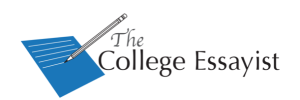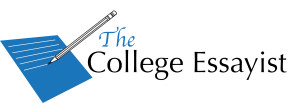For weeks, even months, you have belabored these mere six hundred and fifty words. Crafting a piece of writing that embodies one's eighteen or seventeen years of existence is doubtlessly a tall order. Yet, you persevered, braving word limits, time constraints, writer's block, and essay writing pitfalls. You produced a work that is individual and personal. You created a masterpiece. So, you're done, right? Wrong! Weeks or even months of rewriting cannot replace a final, strategic editing process. Scrutinizing your final draft with a critical eye is a key ingredient of a successful college admissions essay. Believe it or not, despite the painful years of research papers, analytical assignments, and in-class writings, many of us know very little about the editing process. With the proper tools and expertise, you can transform good into great, fashioning a pithy, well-written, and powerful literary self-portrait.
Prior to any discussion of content, grammar, vocabulary, and syntax, it is important to remember the following fundamental editing tips:
- It sounded better in my head. How many of us have said that before? The awkward compliment seemed as though it would work like magic before you said it aloud. We've all been there. Read your college essay out loud. Then, set it aside for a day, and do it again. And then, (you guessed it) do it again! Verbalizing your writing allows you to detect poor word choice, errors in sentence structure, and sections which simply don't sound right. Furthermore, reading out loud automatically places the work in your own voice. You'll know if you gone overboard with ornate vocabulary.
- A fresh perspective. Allowing a friend, teacher, or classmate to read your essay is typically a great idea. However, you must be careful to select those who know you well. You should take their critiques as only suggestions and prioritize maintaining an individual, unique tone. Nevertheless, it is good to incorporate an objective, detached point of view into your editing process.
- Don't be afraid to make the cut. If it doesn't fit, cut it. When in doubt, cut it out. Less is more (you get the picture). After months of slaving over a single piece of writing, it is often difficult to let go. However, clinging to portions of your essay that simply don't work will only hurt you. Simply scratching a large part of your essay does not mean you're not making progress. Instead, it's a sign that you have begun to master the art of editing and that you have an enviable ability to critically examine your own writing.
- Show don't tell. Throughout your application, statistics, test scorers, grades, awards, and lists of extracurricular activities have already told admissions officers who you are. Your essay is a blank canvas on which to show them what defines you. Don't simply state that you are passionate about debate. Describe the rush you feel as you deliver a compelling closing argument. Delineate the invaluable bond of friendship among your teammates. Resist the urge to allow your essay to become another resume.
In addition to these general rules, there are several factors to consider when revising your final draft. First and foremost, do you have a hook? Read the opening line of your essay. Is it boring or engaging? Is it unremarkable or intriguing? The written word is even less forgiving than face to face encounters. You must capture the attention of an admissions officer within the ten seconds it takes to read this all-important first sentence.
Le mot jote. (I too was disappointed to discover that this was not a food). The literal transition of this Latin phrase is "the right word." It refers to the struggle of a writer in selecting an apt term to communicate a particular notion, event, emotion, or epiphany. In an essay as brief as those of the common application, each word must serve a distinct purpose; you should remove redundancy and repetition. Selecting just the right word contributes a certain sophistication and craft to one's writing. For example, describing a new employee as one who continually seeks his own advancement through obtaining favor with those in positions of power is acceptable; yet, simply referring to him as a sycophant is far more appropriate and concise. Each word, each phrase, and each sentence plays an integral role in your tale. A good writer simply cannot afford to waste words. Additionally, effective syntax (the arrangement of words and phrases to create well-formed sentence) goes hand in hand with deft use of vocabulary. Awkward sentence structure can make the message of your paper murky. For instance, when each sentence of a paper is continually written by a student in the passive voice, it is difficult for many people to understand it. This type of writing is considered by many to be an example of poor grammar. The quest to eliminate it has been undertaken by several in the field of academia. (Whew! See how challenging and annoying that is to read?) Avoid overuse of the passive voice.
Finally, a brief note on the arguably obvious, but often overlooked aspects of the editing process. Spelling and grammar are the silent underpinnings of an excellent essay. Misspelled words, misplaced modifiers, comma splices, and malapropisms are like fungus, instantly infecting and destroying an otherwise brilliant work of writing. Do not allow your chances of admissions to be hurt by something as trivial as grammatical errors. Proofread your essay after every edit. Have a teacher or a parent check it as well. Enlist as many people as necessary to help eradicate these pesky mistakes. Remember: proofread frequently, search for the right word, read out loud, watch out for spelling and grammatical errors, and look at your work with a critical eye.









